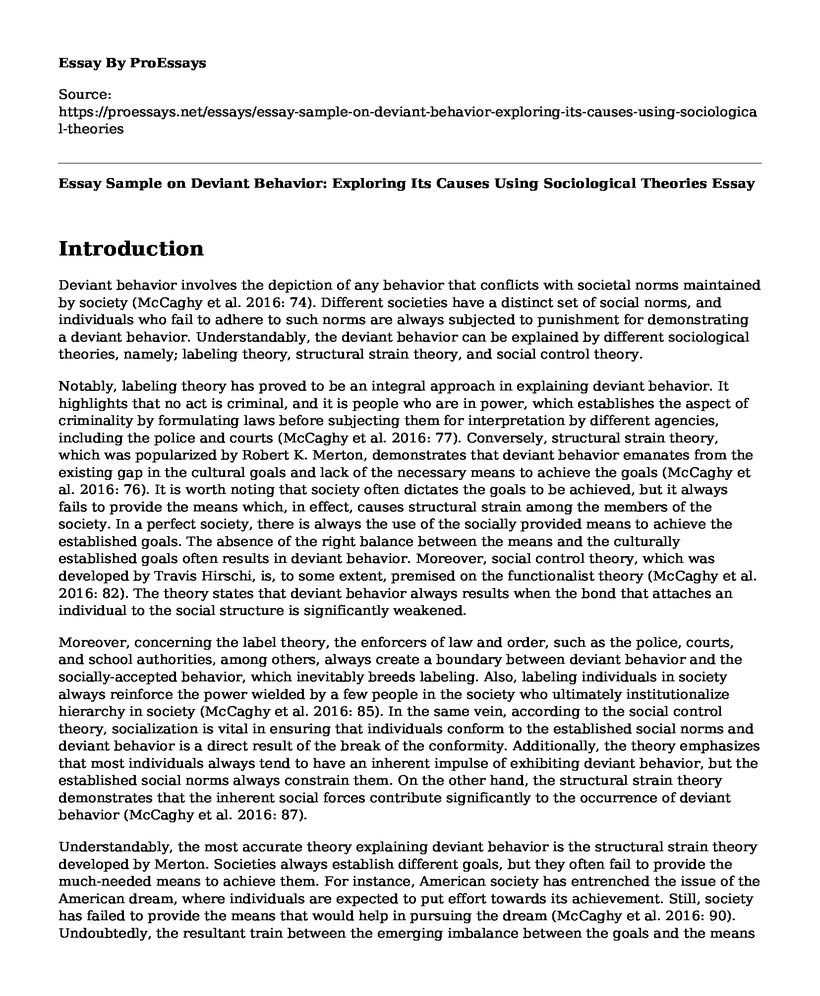Introduction
Deviant behavior involves the depiction of any behavior that conflicts with societal norms maintained by society (McCaghy et al. 2016: 74). Different societies have a distinct set of social norms, and individuals who fail to adhere to such norms are always subjected to punishment for demonstrating a deviant behavior. Understandably, the deviant behavior can be explained by different sociological theories, namely; labeling theory, structural strain theory, and social control theory.
Notably, labeling theory has proved to be an integral approach in explaining deviant behavior. It highlights that no act is criminal, and it is people who are in power, which establishes the aspect of criminality by formulating laws before subjecting them for interpretation by different agencies, including the police and courts (McCaghy et al. 2016: 77). Conversely, structural strain theory, which was popularized by Robert K. Merton, demonstrates that deviant behavior emanates from the existing gap in the cultural goals and lack of the necessary means to achieve the goals (McCaghy et al. 2016: 76). It is worth noting that society often dictates the goals to be achieved, but it always fails to provide the means which, in effect, causes structural strain among the members of the society. In a perfect society, there is always the use of the socially provided means to achieve the established goals. The absence of the right balance between the means and the culturally established goals often results in deviant behavior. Moreover, social control theory, which was developed by Travis Hirschi, is, to some extent, premised on the functionalist theory (McCaghy et al. 2016: 82). The theory states that deviant behavior always results when the bond that attaches an individual to the social structure is significantly weakened.
Moreover, concerning the label theory, the enforcers of law and order, such as the police, courts, and school authorities, among others, always create a boundary between deviant behavior and the socially-accepted behavior, which inevitably breeds labeling. Also, labeling individuals in society always reinforce the power wielded by a few people in the society who ultimately institutionalize hierarchy in society (McCaghy et al. 2016: 85). In the same vein, according to the social control theory, socialization is vital in ensuring that individuals conform to the established social norms and deviant behavior is a direct result of the break of the conformity. Additionally, the theory emphasizes that most individuals always tend to have an inherent impulse of exhibiting deviant behavior, but the established social norms always constrain them. On the other hand, the structural strain theory demonstrates that the inherent social forces contribute significantly to the occurrence of deviant behavior (McCaghy et al. 2016: 87).
Understandably, the most accurate theory explaining deviant behavior is the structural strain theory developed by Merton. Societies always establish different goals, but they often fail to provide the much-needed means to achieve them. For instance, American society has entrenched the issue of the American dream, where individuals are expected to put effort towards its achievement. Still, society has failed to provide the means that would help in pursuing the dream (McCaghy et al. 2016: 90). Undoubtedly, the resultant train between the emerging imbalance between the goals and the means will always create deviant behavior.
Conclusion
In conclusion, deviant behavior may result in adverse effects in society, especially when the cultural norms and values that hold the society together are destroyed. Sociological theories help in providing a better understanding of different environments and situations in which a deviant behavior occurs. It is worth noting that societies should establish social norms and providing the necessary means in which the members of society can uphold such values.
References
McCaghy, Charles H., Timothy A. Capron, J. D. Jamieson, and Sandra Harley H. Carey. 2016. "Deviant Behavior: Crime, Conflict, and Interest Groups." Routledge, pp. 74-95.
Cite this page
Essay Sample on Deviant Behavior: Exploring Its Causes Using Sociological Theories. (2023, Mar 04). Retrieved from https://proessays.net/essays/essay-sample-on-deviant-behavior-exploring-its-causes-using-sociological-theories
If you are the original author of this essay and no longer wish to have it published on the ProEssays website, please click below to request its removal:
- Course Work Example on Social Emotional Development of a Teacher
- Essay on Personal Growth and Development
- Essay Sample on Psychiatric Mental Health Nursing
- Schizophrenia: Case Study
- Essay Example on Emotional Intelligence: Debates & Models
- Essay Example on Dissociative Identity Disorder: Causes & Impact of Trauma
- Paper Sample on 4 Studies Show How Exercise Can Help Alleviate Depression







